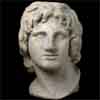Events relating to rome
Aristotle, at the age of seventeen, comes to Athens to join Plato's academy

Alexander the Great is born in Pella, the capital of his father Philip II, at the heart of the expanding Macedonian kingdom
Aristotle is employed in Macedon as tutor to the 13-year-old heir to the throne, Alexander
Homer's Iliad becomes a profound source of inspiration to Alexander, who will keep scrolls of the text in his tent during his conquests

The theatre at Epidaurus is the earliest and best surviving example of a classical Greek stage and auditorium
The Macedonians develop the catapult as a siege engine for the armies of Philip II and Alexander the Great
At a summer feast to celebrate the wedding of his daughter, Philip of Macedon is murdered by one of his courtiers
The League of Corinth elects Alexander to take his father's place as leader of the campaign against Persia
The 21-year-old Alexander the Great marches east with some 5000 cavalry and 30,000 footsoldiers

Indulging in a moment of romantic tourism, Alexander visits Troy at the start of his Persian campaign
Alexander, recreating a classic Greek ceremony, runs naked in Troy to the supposed tomb of Achilles to place a garland
Alexander is presented in Troy with a shield, said to have been dedicated by Athena to the Trojans, which will always accompany him into battle
Alexander moves south through Syria and Palestine, excluding the Persian fleet from their familiar harbours
Alexander the Great's army arrives in Egypt and the Persian governor of the province rapidly surrenders

While in Egypt, Alexander founds Alexandria – the best known of the many towns he establishes to spread Greek culture
As a conclusive end to the long rivalry between Greece and Persia, Alexander destroys the great palace of Xerxes at Persepolis
Alexander takes a major new step, leaving Persian territory and moving through the mountain passes into India
In the Indian monsoon Alexander's Greek troops have finally had enough and threaten to mutiny unless he turns for home
Back in Persia, to emphasize that Greece and Persia are now one, Alexander marries eighty of his senior officers to Persian wives
Alexander, still only 33, dies in Babylon following a banquet
The spread of Greek rule by Alexander introduces the Hellenistic age, which will last for three centuries
The first Roman road, the Via Appia, links Rome with Capua
The flexibility of the Roman legion transforms the Greek phalanx into an even more effective fighting machine
Vesta, goddess of the hearth, is served in Rome by virgin priestesses who tend the sacred flame in her shrine
The Roman siege technique is improved by the 'tortoise' which protects the attacking force









